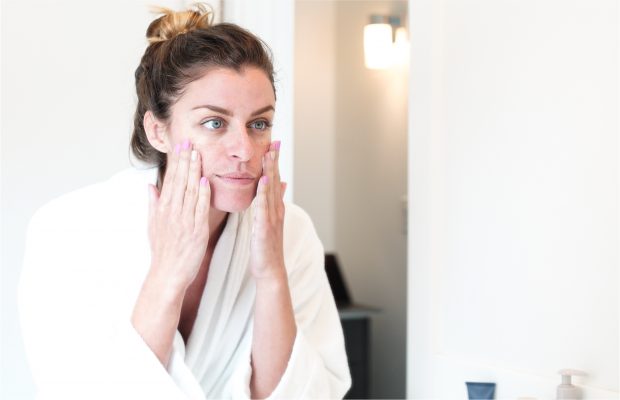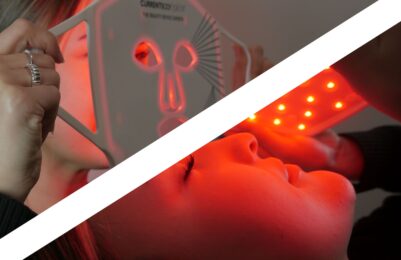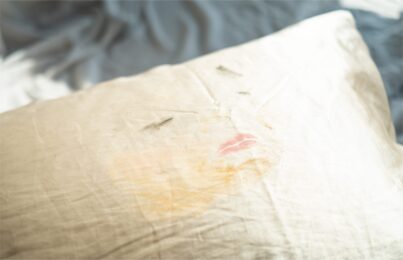In the past month, our lives have been uprooted and most of our daily routines have shifted dramatically. Those of us who can, are staying home and spending a lot more time indoors than usual. Any time we change our habits, it can have an effect on our skin. Here are some changes—both positive and negative—you might see in your skin as a result of staying home.
How Staying Home Might Positively Affect Your Skin
Let’s start with the positive! Here are a few ways your skin might benefit now that you’re staying home.
Not Wearing Makeup Every Day
If you regularly wear a primer or liquid foundation, you may start seeing a reduction in clogged pores while going makeup-free. Unfortunately, long-wear foundation and primer are both notorious for causing clogged pores and bumpy texture. If you stop regularly using your makeup products for a few weeks and see a significant reduction in your clogged pores, you may want to re-think what you use going forward. Check out my list of the best foundations for oily, acne-prone skin.
Makeup isn’t all bad though. Keep in mind that it can act as a UV protectant to prevent premature skin aging as I explain in this post, so it can be a good idea to still wear some—even if it’s just a light layer.
Spending More Time On Your Skin
Skincare can feel like an indulgent form of self-care, but let’s be honest—our busy lives don’t always allow us to take the time. If you do find yourself with extra time on your hands, this is the perfect time to start giving your skin a little more love and attention.
If you want to up your skincare game without overhauling your whole routine, this is the perfect time to try an at-home facial or a DIY chemical peel.
Getting a Virtual Consultation
This is as good a time as any to really customize your skincare routine and figure out what works best for you. Many companies, including my own, are offering virtual consultations for personalized skincare advice. We’ve been offering our My Skin Rx program for years and lately, it’s been busier than ever. If you are confused about your skin and in need of expert advice, it’s worth booking a consultation with one of our experienced estheticians so they can guide you to the best routine for your skin type.
How Staying Home Might Negatively Affect Your Skin
The bad news is there are a lot more potential negatives than positives in this situation. The good news is, I have the advice to help you deal with whatever skin woes quarantine throws your way! Let’s begin.
Problem: You’re Breaking Out More
I’ve heard from a lot of clients that they’ve been breaking out more since being quarantined. It’s safe to say most of us are pretty stressed out by the current state of things. Stress can negatively impact your life in many ways, and your skin is no exception.
When we feel stressed, our adrenal glands start over-producing cortisol, the body’s main stress hormone. Cortisol actually triggers our sebaceous glands to produce more oil, meaning our skin can get extra oily when we’re worried about something. People experiencing higher levels of stress are more likely in general to see an increase in acne, but they’re also more likely to get inflamed, pus-filled papules rather than simple whiteheads or blackheads. Simply put, stress makes acne more severe.
A lot of us may also be turning to comfort food at this time—I know I’ve certainly been indulging more than usual. (Chocolate chip cookies are my go-to these days!) A common misconception is that greasy foods cause acne. This actually isn’t the case, and I’ve known many people who eat lots of greasy food and still have perfect skin (seems unfair, I know). That said, whenever you make a change to your lifestyle, diet included, it has the potential to become a catalyst for increased breakouts.
Solution
The easiest solution for reducing stress and stress breakouts is getting seven to eight hours of sleep every night. It may sound simplistic, but the research is crystal clear. Sleep (or lack thereof) affects every aspect of your health and well-being, both physically and mentally. It’s essential, not just for tissue repair and regeneration, but also to maintain strong immune function (which is needed to fight off acne). When our bodies are under tremendous stress and fatigue, not getting enough sleep only perpetuates the cycle.
This is also a great time to make sure you’re reaching out to family and friends—one of my favorite ways to reduce stress. When it comes to skincare, I always tell people not to go it alone. This certainly applies to life as well!
As far as diet is concerned, think about the types of food you’ve been eating lately. As I mentioned, greasy food hasn’t actually been shown to cause acne. That said, there is limited evidence that sugar makes breakouts worse for some. The most common culprit, though, when it comes to food triggering acne, is dairy. The link between dairy and cystic acne has been well-established, so if you’re experiencing more breakouts around the chin and jawline area, this is something to consider.
Of course, avoiding stress and dairy altogether isn’t always realistic (after all, what’s life without a little ice cream?). For extra help, I recommend Rapid Response Detox Masque. Think of it as topical stress relief for your skin. Use this masque at night after cleansing to quickly put the fire out and lessen stress-related skin issues.
Is your protective face mask making you break out more than usual? Here’s help.
Problem: You’re Not Being Diligent About Your Routine
Very little feels routine right now, so you could easily be forgiven for slipping when it comes to your skincare regimen. That said, know that if you’ve been noticing changes in your skin, this could definitely be a contributing factor. A lot of people might be getting lazy about washing their faces, which can lead to clogged pores, blackheads, and breakouts. If you’re not being as diligent about using active ingredients like vitamin C, retinol, or exfoliating acids, you may see old skin concerns start to creep back (think fine lines, pigmentation, and surface dryness).
Solution
Even if you’re not wearing makeup during the day, it’s important to wash your face before going to bed to remove oil and dirt. Products with active ingredients also work best when used consistently, so staying on top of a regular routine is important for optimum skin health.
Here’s a tip I give my clients who have a hard time sticking to a nighttime routine: do your routine early in the evening when you have more energy. The skin goes into repair mode as soon as the sun starts to go down, so why not perform your nighttime routine when you have more motivation? This way, you won’t have to force yourself to do it later.
I also want to call out SPF. A lot of people think that if they’re spending the day indoors, there’s no need to wear sunscreen. This is a common misconception. Even if you’re not exposed to direct sunlight, any visible light has the ability to cause long-term damage to your skin. Bottom line? Unless you live in a house with absolutely no windows, you need to be wearing SPF. If nothing else, make a point to wash your face and apply sunscreen before starting your day.
Problem: Your Hand Cream is Clogging Your Pores
If you notice that you’re getting a bumpy texture predominantly on the sides of your face, your hand cream could be clogging your pores. I was actually seeing this issue so often that I wrote a blog post about it. Now that we’re all being extra diligent about washing our hands, many of us are also using thick hand creams at night to compensate for moisture loss. If you’re someone who sleeps with your hand on your face, this cream could be transferring to your skin and causing clogged pores. This is especially problematic if you’re not being diligent about washing your face in the morning.
Solution
If you’re struggling with dry hands, one thing I recommend (and often do myself) is slathering on a thick ointment at night then slipping on a pair of cotton gloves. Cotton is nice and breathable so it won’t feel hot, but adding that physical barrier over your hands will force moisture deeper into the skin. The added bonus here is that the gloves will keep the cream or ointment off your face, so no need to worry about clogged pores.
Learn more about how to keep your hands healthy while washing them often, including the layering technique I use before putting my gloves on at night.
Problem: You’re Picking at Your Skin
Whether you’re doing it out of stress, boredom, or a combination of the two, picking can do real damage to your skin. Short-term, it can spread bacteria and cause inflammation, leading to more breakouts. Long-term, skin picking can cause serious pigmentation and even scarring (mostly pitted scars, also known as “ice pick” scars).
Solution
I know a lot of us are stuck inside, which makes us prone to closely examining our skin. Combine this with boredom and stress, and there’s no doubt it can be a challenge to stop picking at your skin. If you’re not sure where to start, read my guide to breaking your picking habit for advice and guidance. Think of the current directive to frequently wash hands and keep them off your face as yet another reason to refrain from picking!
Problem: You’ve Been Experimenting With Products and It’s Messing With Your Skin
Let’s face it, this is the perfect time to clean out your medicine cabinet and start experimenting with forgotten skincare samples or half-used bottles of product. There’s nothing wrong with trying something new, but introducing too much too fast can be really hard on your skin. What’s worse, if you start introducing multiple products at once, you can’t know which one (or which ones) are causing any breakouts or bad reactions that may occur.
Solution
I always urge my clients to be cautious when adding new products into their routine (even products from my own line). One reason for this is that a new product could cause purging or breakouts. If your skin is sensitive, you also need to be on the lookout for negative reactions.
If you are experimenting, avoid a negative reaction by waiting a minimum of two days between introducing products. Performing a patch test is also a great way to make sure that a product won’t clog your pores or irritate your skin.
The bottom line is that, when our lives and daily routines change, it can impact our skin in all kinds of unexpected ways. I hope this post finds you all safe, helps you get to the bottom of what’s happening with your skin and gives you some good solutions!
Celebrity Esthetician & Skincare Expert
As an esthetician trained in cosmetic chemistry, Renée Rouleau has spent 35 years researching skin, educating her audience, and building an award-winning line of products. Her hands-on experience as an esthetician and trusted skin care expert has created a real-world solution — products that are formulated for nine different types of skin so your face will get exactly what it needs to look and feel its best. Trusted by celebrities, editors, bloggers, and skincare obsessives around the globe, her vast real-world knowledge and constant research are why Marie Claire calls her “the most passionate skin practitioner we know.”


